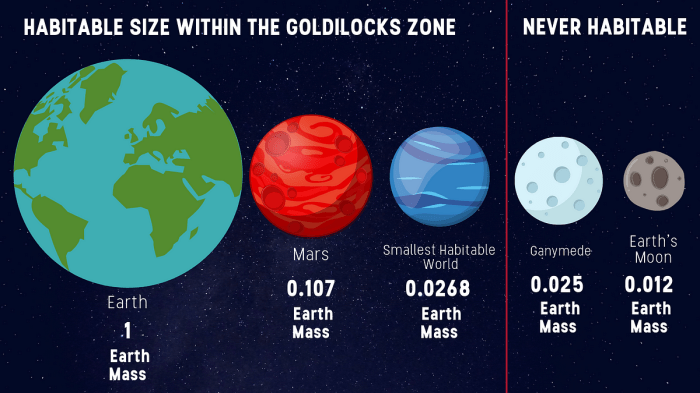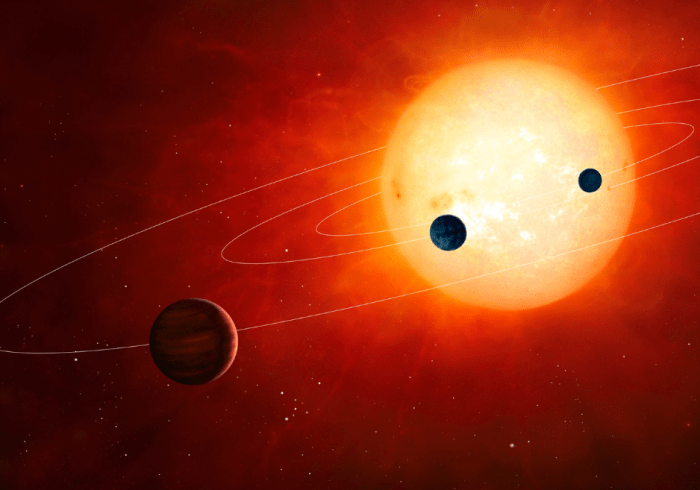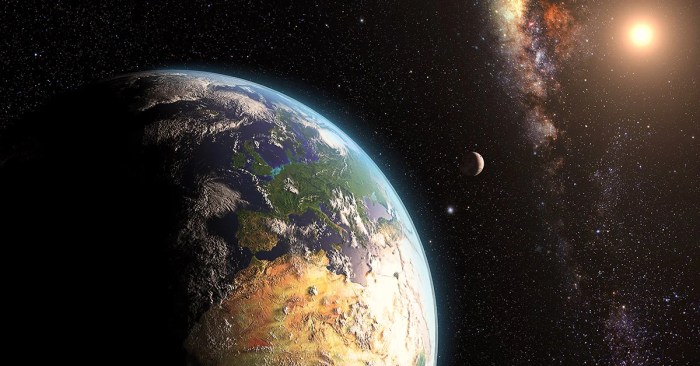Goldilocks and life on other planets answer key – The search for life beyond Earth has captivated scientists and philosophers for centuries. With the advent of powerful telescopes and advanced scientific techniques, we are now closer than ever to answering the question: are we alone in the universe? The Goldilocks Zone, a concept that defines the habitable range of conditions for life, plays a crucial role in this quest.
This comprehensive guide, “Goldilocks and Life on Other Planets: The Answer Key,” provides an in-depth exploration of the Goldilocks Zone and its implications for life on other planets. We will delve into the essential conditions necessary for life to arise and thrive, discuss the methods and challenges of searching for extraterrestrial life, and examine the profound scientific and philosophical implications of discovering life beyond our own planet.
The Goldilocks Zone

The Goldilocks Zone, also known as the habitable zone, is a region around a star where the conditions are suitable for liquid water to exist on the surface of a planet. Liquid water is essential for life as we know it, and the Goldilocks Zone is therefore considered to be the most promising place to search for extraterrestrial life.
The Goldilocks Zone is defined by the distance from a star. A planet that is too close to its star will be too hot, and all of the water on its surface will evaporate. A planet that is too far from its star will be too cold, and all of the water on its surface will freeze.
The Goldilocks Zone is the region in between these two extremes, where the temperature is just right for liquid water to exist.
In addition to temperature, the Goldilocks Zone also requires a planet to have a stable atmosphere. The atmosphere must be thick enough to protect the planet from harmful radiation, but it must not be so thick that it traps too much heat.
The atmosphere must also contain oxygen and other gases that are essential for life.
Planets in the Goldilocks Zone
- Earth
- Mars (debatable)
- Venus (debatable)
- Kepler-452b
- Kepler-186f
Conditions for Life

In addition to being in the Goldilocks Zone, a planet must also have a number of other conditions in order to support life. These conditions include:
- Liquid water
- A stable atmosphere
- A source of energy
- Raw materials
Liquid water is essential for life because it is the solvent for all of the chemical reactions that occur in living cells. A stable atmosphere is necessary to protect the planet from harmful radiation and to regulate the temperature. A source of energy is necessary to power the chemical reactions that occur in living cells.
Raw materials are necessary to build the molecules that make up living cells.
Life in Extreme Environments
While the conditions for life are relatively well-defined, there is evidence that life can exist in extreme environments. For example, some bacteria have been found living in hydrothermal vents, which are hot springs that release chemicals from the Earth’s interior.
Other bacteria have been found living under ice sheets, where the temperature is below freezing. These findings suggest that life may be able to exist in a wider range of conditions than we previously thought.
Search for Life on Other Planets

The search for life on other planets is one of the most exciting and challenging endeavors in science. Astronomers are using a variety of methods to search for life, including:
- Observing exoplanets
- Searching for biosignatures
- Sending probes to other planets
Observing exoplanets is one of the most promising methods for finding life on other planets. Exoplanets are planets that orbit stars other than the Sun. Astronomers have discovered thousands of exoplanets in recent years, and some of these exoplanets are located in the Goldilocks Zone of their stars.
Searching for biosignatures is another method for finding life on other planets. Biosignatures are molecules or other signs that indicate the presence of life. Astronomers are searching for biosignatures in the atmospheres of exoplanets and in the dust and gas around stars.
Sending probes to other planets is the most direct way to search for life. Probes can land on planets and collect samples of the soil and atmosphere. These samples can then be analyzed for signs of life.
Challenges and Limitations
The search for life on other planets is a challenging endeavor. One of the biggest challenges is the distance between Earth and other planets. Even the closest exoplanets are millions of miles away, and it would take years to send a probe to one of these planets.
Another challenge is the difficulty of detecting life on other planets. Life on other planets may be very different from life on Earth, and we may not be able to recognize it if we find it.
Promising Exoplanets
Despite the challenges, there are a number of exoplanets that are considered to be promising candidates for harboring life. These exoplanets include:
- Kepler-452b
- Kepler-186f
- TRAPPIST-1e
- Proxima Centauri b
Implications of Finding Life on Other Planets

The discovery of life on other planets would have a profound impact on our understanding of the universe and our place within it. It would show that life is not unique to Earth, and it would raise the possibility that life may be common throughout the universe.
The discovery of life on other planets would also have a significant impact on our philosophy and religion. It would challenge our traditional beliefs about the nature of life and the purpose of humanity.
The discovery of life on other planets would also have a number of ethical implications. We would need to decide how to interact with extraterrestrial life, and we would need to consider the rights of any intelligent beings that we may encounter.
Scientific and Philosophical Implications, Goldilocks and life on other planets answer key
The discovery of life on other planets would have a profound impact on our scientific understanding of the universe. It would show that life is not unique to Earth, and it would raise the possibility that life may be common throughout the universe.
This would have a major impact on our understanding of the origin and evolution of life.
The discovery of life on other planets would also have a significant impact on our philosophy. It would challenge our traditional beliefs about the nature of life and the purpose of humanity. We would need to rethink our place in the universe and our relationship to other living beings.
Ethical Considerations
The discovery of life on other planets would also have a number of ethical implications. We would need to decide how to interact with extraterrestrial life, and we would need to consider the rights of any intelligent beings that we may encounter.
One of the most important ethical considerations is the question of whether or not we should make contact with extraterrestrial life. If we do make contact, we need to be careful not to harm or exploit them. We also need to be prepared for the possibility that they may not be friendly.
Popular Questions: Goldilocks And Life On Other Planets Answer Key
What is the Goldilocks Zone?
The Goldilocks Zone is a range of distances from a star within which a planet can maintain liquid water on its surface. This is considered a crucial factor for the potential for life to arise and thrive.
What are the essential conditions for life on a planet?
The essential conditions for life on a planet include the presence of liquid water, a stable temperature range, and an atmosphere that supports the exchange of gases.
How do scientists search for life on other planets?
Scientists search for life on other planets using a variety of methods, including observing exoplanets for signs of atmospheric gases associated with life, analyzing data from space probes, and searching for radio signals from extraterrestrial civilizations.
What are the implications of finding life on other planets?
The implications of finding life on other planets are profound and far-reaching. It would challenge our understanding of the universe, our place within it, and the potential for life to arise and evolve in diverse environments.